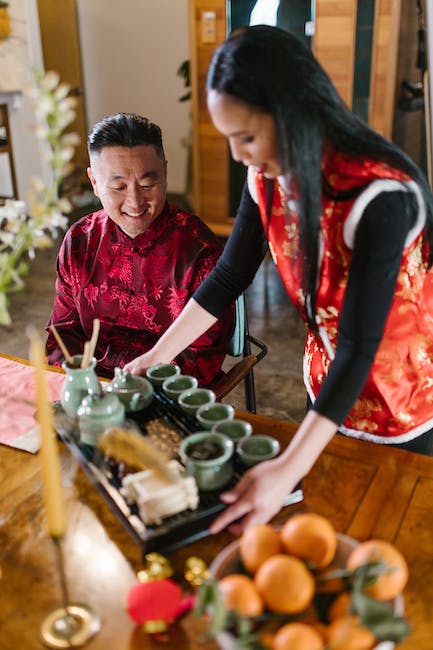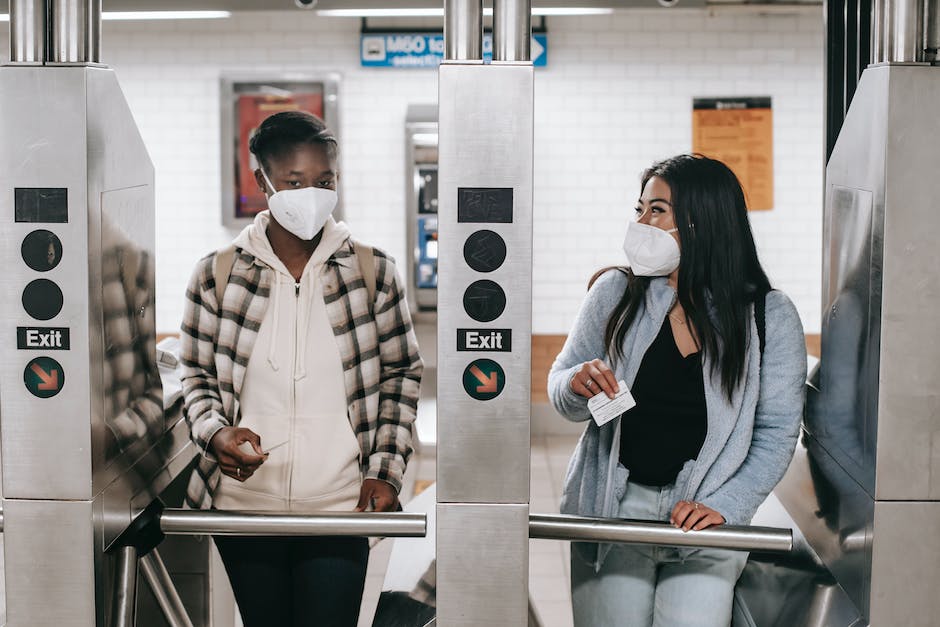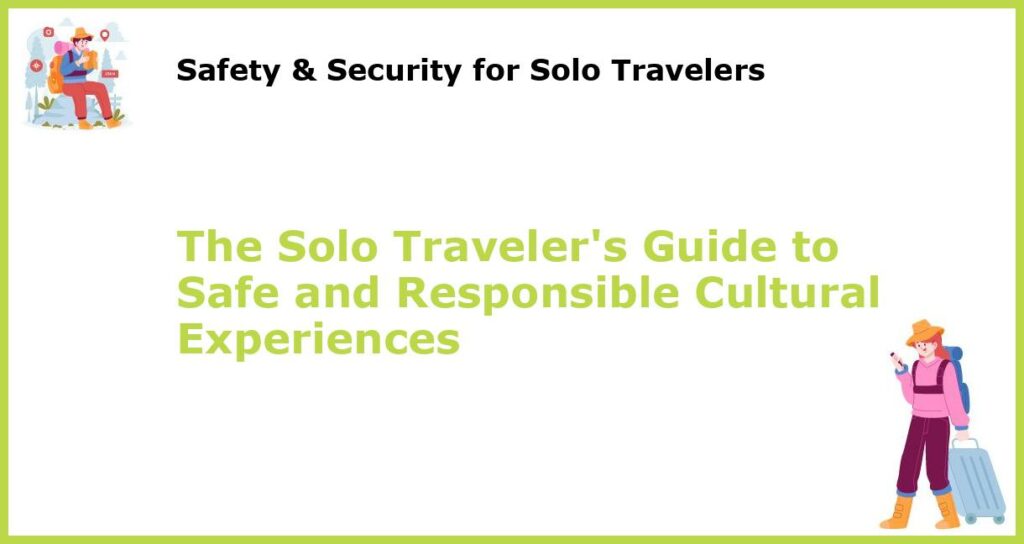Solo traveling can be an enriching experience, providing you the opportunity to connect with different cultures, learn new things, and make amazing memories. However, it can also be intimidating and dangerous, especially if you’re not cautious. For this reason, we have created a guide to safe and responsible cultural experiences for the solo traveler.
1. Know the Cultural Norms Before You Go

It’s essential to research and study the cultural norms of your intended destination before embarking on your trip. Different cultures have unique do’s and don’ts, dress codes, and social customs. Studying these before your departure can help you avoid getting into trouble or offending locals. For example, in some countries, it’s recommended that you dress modestly to show respect. Ensure that you pack clothing that covers your knees and shoulders.
You should also research about the cuisine and local foods, as well as if there are any specific etiquette rules while dining. In some cultures, using your left hand while eating or passing food can be offensive. Furthermore, some cultures have sacred or holy sites, and you should dress appropriately, ensure silence, and follow the guidelines set by the religious leaders there.
2. Keep Your Valuables Safe

You need to be extra cautious with your belongings when solo traveling, especially if you are carrying valuables like a camera, jewelry, or expensive electronics. To avoid theft, choose a backpack or purse that can be locked, and never leave them unattended, even for a second. Put your cash, credit cards, and documents in different bags or pockets. Besides, you should avoid flaunting your valuables, especially in areas that have a high crime rate. If you need to use an ATM, use one in a safe, well-lit location.
Alternatively, consider traveling in clothes that conceal valuables such as a scarf, a jacket, a money belt, or a fanny pack that sits against your front. This will reduce the temptation for petty theft.
3. Be Respectful of Local Customs

One of the most crucial aspects of responsible solo travel is being respectful and mindful of local customs and traditions. Not all cultures have the same customs, and some behavior that is acceptable in your country could be offensive or even illegal in another. Therefore, it’s essential to research and understand the traditions and history of the people and places you will visit well in advance.
You should also avoid taking photographs or videos of locals without permission. In some cultures, it is seen as a violation of personal privacy. Asking permission is a good way to connect with locals and gain insight on the local customs. Be mindful of your behavior and the way you dress when visiting religious or sacred sites. Avoid touching or treating these sites disrespectfully, as it can be seen as a cultural and religious offense.
4. Choose Safe Accommodation

Your safety is a priority when traveling solo. Therefore, you need to choose accommodations with safety measures like CCTV, guards, or 24-hour reception desks. Reviews and ratings from previous guests can also help you steer clear of accommodations that are not safe. Alternatively, you could book through an established agency or consider choosing a home-share with trusted reviews. Let the hotel staff know about your itinerary and whereabouts, especially when traveling to remote areas.
You should also invest in a door jammer, a lock, or carry a small security lock, especially if you feel insecure about the security in your hotel room. You could also ask for specific rooms on higher floors to eliminate intrusion options through windows.
5. Don’t Walk Alone at Night

Walking alone at night increases your vulnerability, making you an easy target for opportunistic thieves or even more dangerous crimes. Avoid venturing out after dark if possible, or if you have to, opt to go in groups with other travelers or locals. If you need to go out alone in unfamiliar areas, be informed about the neighborhood’s safety and keep someone updated on your whereabouts. Some cities also have late-night ride services that cater to solo travelers.
6. Learn Basic Phrases

Learning a few basic phrases of the local language before your trip can help you interact with the locals better, make your experience more memorable, and break the ice. It would be best if you learned important phrases like ‘hello,’ ‘thank you,’ ‘please,’ and ‘excuse me,’ among others. Using these phrases will show the locals that you have a willingness to learn their cultural practices and they will likely offer more of their time and knowledge. Besides, learning numbers, names of familiar foods, and directions could help you better communicate with locals in case of emergencies.
Carry a small, pocket-size phrasebook or have a language app downloaded on your phone with essential words and phrases. This could help you in low or no internet connection areas.
7. Be Careful with Alcohol

Drinking alcohol in moderation in a social gathering could be a cultural experience, but drinking to excess or alone can increase the vulnerability of solo travelers. Be mindful of the surroundings and people around you. Avoid traveling to out-of-the-way places with strangers or newly-acquainted friends. Research the customs around drinking as some cultures consider drinking taboo or limit drinking to specific events. Always keep your drink within sight and avoid leaving it unattended, as unscrupulous individuals could spike it with drugs.
8. Follow Local Laws

Laws and regulations differ from country to country. It’s not just the criminal law that varies, but even the civic law, hygiene rules, and social etiquette varies also. For instance, some cities make it illegal to litter, while others have regulations on smoking in public. It’s crucial to follow these laws, ask the locals, seek advice from your hotel staff, and even read the signs on the streets to avoid heavy fines or legal repercussions. Avoiding risky behavior like jaywalking, crossing at non-designated areas, and breaking traffic rules can also keep you safe.
9. Stay Connected

Being connected enables you to navigate better, stay in touch with loved ones, or even request assistance in case of an emergency. Make arrangements to stay connected before setting off on your journey – this includes getting a local SIM card or a portable Wi-Fi device. Always inform someone of your whereabouts and how to find you. If you’re traveling to remote areas with no internet or cellular connectivity, confirm with the authorities if there are any call-boxes or satellite phones available for use.
10. Trust Your Gut
Your instincts and gut feelings are a primal defense mechanism that could get you out of sticky situations if you pay attention. If you sense danger or feel uncomfortable in a specific location or with some locals, remove yourself from the area immediately. Avoid making excuses or rationalizing these feelings, as they are often accurate. Solo travel can be unpredictable, and going with your instincts could be all that stands between you and danger.








 You might also be interested in those articles related to solo traveling
You might also be interested in those articles related to solo traveling